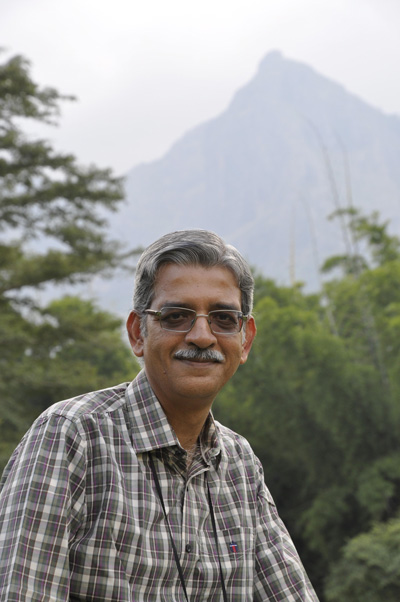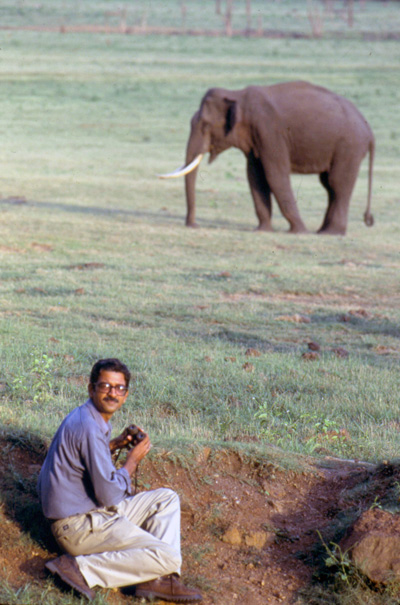 In the 1970s, before he was a conservation ecologist, Raman Sukumar was a host for a local radio station in Chennai, India. He recalls that the first piece of music he ever played was Baby Elephant Walk. Since then, our understanding of elephant behaviour has come a long way, and Sukumar has played a large role. "It's a highly social animal, it shows high levels of cognitive ability, it's got a unique relationship with people," said Sukumar. "That makes it much more fascinating as a study creature compared to the rhinoceros, for instance."
In the 1970s, before he was a conservation ecologist, Raman Sukumar was a host for a local radio station in Chennai, India. He recalls that the first piece of music he ever played was Baby Elephant Walk. Since then, our understanding of elephant behaviour has come a long way, and Sukumar has played a large role. "It's a highly social animal, it shows high levels of cognitive ability, it's got a unique relationship with people," said Sukumar. "That makes it much more fascinating as a study creature compared to the rhinoceros, for instance."
Sukumar, one of TWAS's 52 recently elected Fellows, is a professor at the Indian Institute of Science's Centre for Ecological Sciences in Bengaluru, India, and a globally recognized authority on the ecology, behaviour and conservation of elephants. Much of his work is on finding ways to help elephants and people coexist in India – where human farmers encroach on elephants' habitats and elephants consume farmers' crops. The conflicts are bad enough that they sometimes turn deadly, for both the elephants and the humans.
When Sukumar began his work in 1980, the general consensus was that elephants feed on farm crops basically because they had lost their habitat, but Sukumar's work found that this wasn't the whole picture. For example, while Indian elephants can lose their forest habitats through deforestation and agriculture, they're not being driven out of their territory so much as keeping the lands they've always known. Sometimes, forests even become fragmented, and elephants will have to cross farms to get from one patch of trees to another. Apparently, they figure they may as well eat on the way.
 Also, an elephant may munch on a farmer's crops by choice; life in the jungle is hard, because there are only certain trees it can feed upon. But when an elephant encounters a barley or sugarcane field, those fields amount to a buffet of nutritious, tasty, convenient food. As interpreted by Sukumar, the elephant thinks: 'This different kind of food is in my territory, so I'll just use that instead.'
Also, an elephant may munch on a farmer's crops by choice; life in the jungle is hard, because there are only certain trees it can feed upon. But when an elephant encounters a barley or sugarcane field, those fields amount to a buffet of nutritious, tasty, convenient food. As interpreted by Sukumar, the elephant thinks: 'This different kind of food is in my territory, so I'll just use that instead.'
This is especially important for male elephants, which Sukumar has found raid crops five times as often as females. That's because in order to successfully mate in the matriarchal order of elephants, males need to be healthy enough to enter an intensely hormonal state called musth. Male elements feeding on farmers' crops can enter musth more efficiently, leaving them more time for socializing and actively competing to reproduce.
A better understanding of the elephants' motivations has given scientists a better picture of how to help people and pachyderms coexist. It's not simple work, but landscape planners can makes sure corridors of forestland are available for elephants between patches of forest in their territories to make it less likely they'll stumble upon farmland. And since, in most herds, only two or three males cause a majority of the conflicts with farmers, people can identify and remove only those specific males by identifying them and taking them into captivity rather than waiting for violence to rise to the surface. "You don't have to shoot them or kill them," Sukumar said. "In India there are examples of elephants who have killed a dozen people but still have been tamed successfully. When an elephant comes into captivity it becomes extremely docile."
Sukumar, whose work has also included insights to tropical forest ecology and climate change, said he's thrilled about his election as a TWAS member. "I'm happy that my work has been recognized because I do a mixture of basic science and applied science, and very often science academies really go for people doing basic science rather than application. So I'm happy they recognized both the applied and basic work that I do." He added that he's looking forward to learning how he can contribute to TWAS's activities.
* * *
Every year TWAS elects dozens of scientists who have taken great strides in advancing their chosen fields as TWAS members. Some of them live and work in the developing world and some are researchers in developed countries whose efforts contribute to scientific growth the South. Candidates for membership are nominated and evaluated by established members, and then elected from a short-list each year by panels of members at the TWAS General Meeting.
At the 2013 General Meeting in Buenos Aires, Argentina, they elected 52 new members, raising the total membership to 1,110. Of the new members, 12 are from India, 11 are from Brazil, nine are from China, four are from Taiwan, China, and two are from Vietnam. One each was elected from Australia, Azerbaijan, Benin, Ethiopia, France, Japan, Kenya, Pakistan, South Korea, Tanzania, Thailand, the United Kingdom, the United States and Venezuela. Six of the 52 new members are women. Regionally, 29 are from developing countries in Asia, 11 from Latin America, 3 from Sub-Saharan Africa, and none are from the Arab Region.
- Section 1, Agricultural Sciences: Ricardo Antunes de Azevedo of Brazil; Zeyaur Rahman Khan of India; Papa Abdoulaye Seck of Senegal; and Zhu Yuxian of China.
- Section 2, Structural, Cell and Molecular Biology: Soo-Chen Cheng of Taiwan, China; Takashi Gojobori of Japan; Tao-Shih Hsieh of Taiwan, China; Helena B. Nader of Brazil; and Jayant Udgaonkar of India.
- Section 3, Biological Systems and Organisms: Anwar Gilani of Pakistan; Jitendra Paul Khurana of India; Luiz Drude de Lacerda of Brazil; Lee Sang Yup of Republic of Korea; and Raman Sukumar of India.
- Section 4, Medical and Health Sciences including Neurosciences: Abraham Aseffa of Ethiopia; Mauricio L. Barreto of Brazil; Kathryn Song Eng Cheah of Malaysia; Yuk Ming Dennis Lo of China (winner of TWAS's 2012 Ernesto Illy Trieste Science Prize); Narinder Kumar Mehra of India; and Viswanathan Mohan of India.
- Section 5, Chemical Sciences: Christian Amatore of France; Vanderlan da Silva Bolzani of Brazil; Pratim Kumar Chattaraj of India; Xiao-Ming Chen of China; Song Gao of China; Martyn Poliakoff of the United Kingdom; and He Tian of China.
- Section 6, Engineering Sciences: Ali Abbasov of Azerbaijan; Chennupati Jagadish of Australia; Anurag Kumar of India; Ranjan Kumar Mallik of India; Mei Hong of China; and Bhim Singh of India.
- Section 7, Astronomy, Space and Earth Sciences: Eduardo Luiz Damiani Bica of Brazil; Alexander Wilhelm Armin Kellner of Brazil; Shaw Chen Liu of Taiwan, China; Evelyne Isaack Mbede of Tanzania; David Ruffolo of Thailand; and Sreedharan Krishnakumari Satheesh of India.
- Section 8, Mathematical Sciences: Artur Oscar Lopes of Brazil; Quoc-Khanh Phan of Vietnam; Hoang Xuan Phu of Vietnam; and Ivan Shestakov (Chestakov) of Brazil.
- Section 9, Physics: Nathan Berkovits of Brazil; Adalberto Fazzio of Brazil; Anamaría Font of Venezuela; Shih-Chang Lee of Taiwan, China; Juan Martin Maldacena of the United States; Deepak Mathur of India; and Bao-Gen Shen China.
- Section 10, Social and Economic Sciences: Kaushik Basu of India; and Jikun Huang of China.
– Sean Treacy

